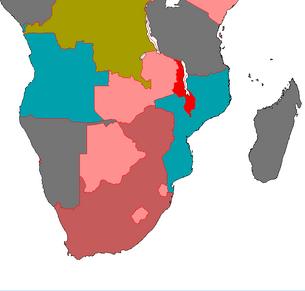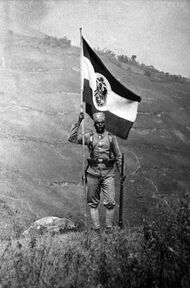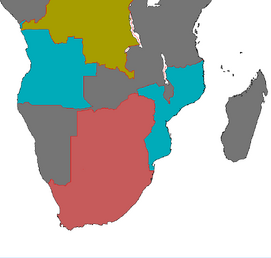- One or more subjects within this article are under rework, and may no longer be accurate.
- This article is designated a work in progress. Please ask the wiki team before adding content.
The Second Ultimatum to Portugal was a written ultimatum addressed to Portuguese Prime Minister Mitchell de Paiva Couceiro from Alfred von Tirpitz, Chancellor of the German Empire shortly after the British Revolution began in early 1925. As part of the ultimatum, the Germans demanded the immediate withdrawal of Portuguese forces from British Nyasaland, which had been occupied as a consequence of the ongoing revolution in Britain and resulting Collapse of the British Empire. Germany stipulated in the ultimatum that the British colonies of North Rhodesia and Nyasaland were under the protection of Germany, and as a result Portugal was infringing upon the German sphere of influence.
After heavy internal debate, Portugal reluctantly accepted the ultimatum, knowing their allies in Ottawa and Algiers were unable to support them in a hypothetical colonial war with Germany, and withdrew from Nyasaland back to Mozambique as a result. The Second Ultimatum would prove to be a humiliating loss of prestige for the young Kingdom and would lead to a coup by José Hipólito Raposo and the Integralismo Lusitano a few months later.
Historical context[]

European Colonies in Southern Africa (1925); Nyasaland (red)
The beginning of the British Revolution in March of 1925 meant that the British overseas colonies came under direct pressure from other nations. Both Germany as well as Portugal wanted to connect their African colonies by acquiring British possessions. Germany wished to continue its expansion of Mittelafrika and finally gain a land connection between German South West Africa and German East Africa and the Congo. Portugal wished to take control of the territories it claimed in the "Pink Map" of 1885, which included Nyasaland and almost all of North and South Rhodesia.
Initially South Africa and Portugal, both members of the Entente and participants in the Weltkrieg as British allies, stepped in under the pretext of safeguarding British colonies from German annexation. The Statthalter of Mittelafrika, Paul von Lettow-Vorbeck, quickly issued a warning that any aggression towards British possessions in Africa would destabilize the region and would not be tolerated. Both Portugal as well as South Africa largely ignored this statement, since it did not have any official backing from Berlin.
The chain of command (and supply) of the British military had shattered with the revolution. Lacking any orders from London, the token forces that the United Kingdom had in its African colonies largely stood down when confronted by Portuguese and South African troops in Nyasaland and Bechuanaland respectively. The South Rhodesian colonial government elected to join South Africa on April 15th as a member state of the union.
Second Ultimatum and German annexations[]

A German Askari planting the German colonial flag in newly-occupied British Nyasaland (1925)
Fearing a successful Entente landgrab in Southern Africa and after realizing that the British colonial forces did not resist occupation by South Africa and Portugal, Chancellor von Tirpitz officially presented Mitchell de Paiva Couceiro with the Second Ultimatum. It stated that the British colonies north of the Zambezi river, from the Caprivi-Strip to the Indian Ocean would be occupied by German troops. This meant that the South African annexations of South Rhodesia and the occupation of Bechuanaland would be tolerated while Portugal would have to withdraw from Nyasaland or face military action by the German Empire.
Portugal accepted the ultimatum on June 4th, after realizing that the establishment of the Union of Britain seemed irreversible and knowing that support from the Entente for its cause was highly unlikely. Portugal handed over control of Nyasaland to Mittelafrika by late June.
Outcome[]
WIP!
After the handover of Nyasaland and the occupation of North Rhodesia, Germany was able to connect South West Africa with the rest of Mittelafrika.

Southern Africa after the Second Ultimatum (1925)
Portugal suffered a humiliating loss of prestige by being forced to accept the terms of the Second Ultimatum. In 1926 and as a result of the general discontent following the economic downturn in Portugal as well as the loss of colonial prestige, the Integralismo Lusitano movement sweeped the elections with its radical platform, and immeditaly set itself on reforming the Portuguese colonial administration.
